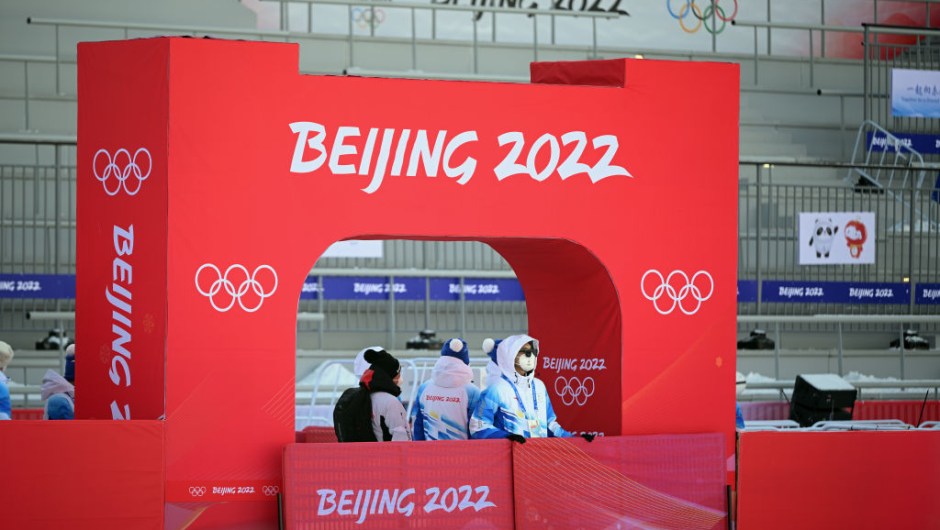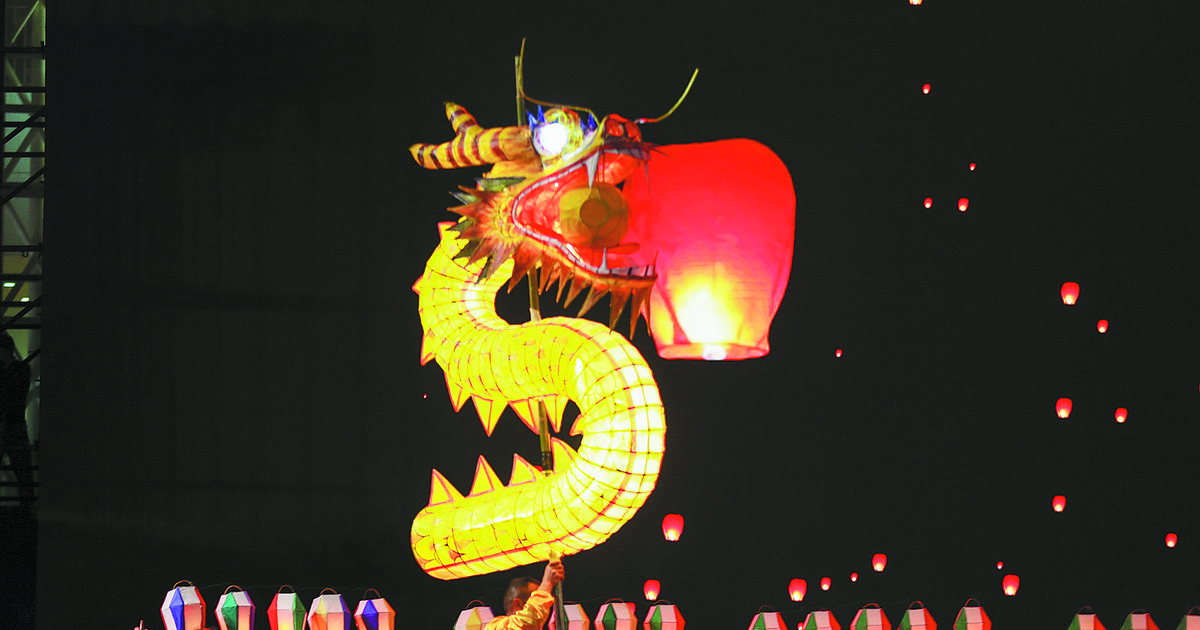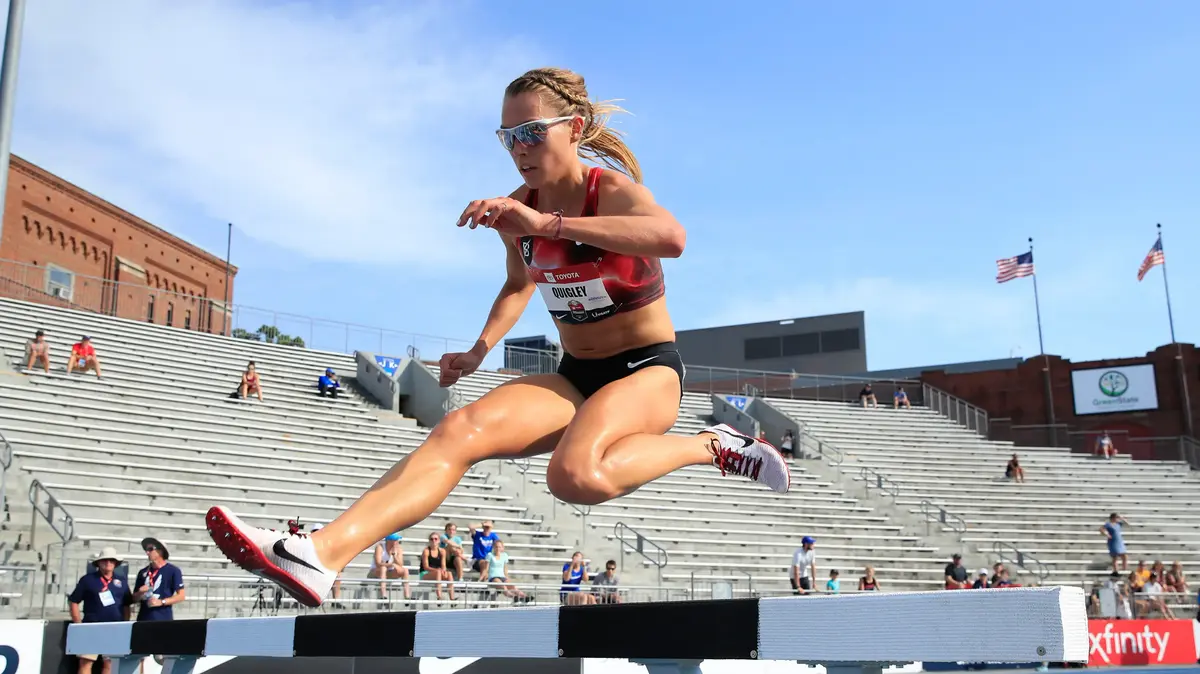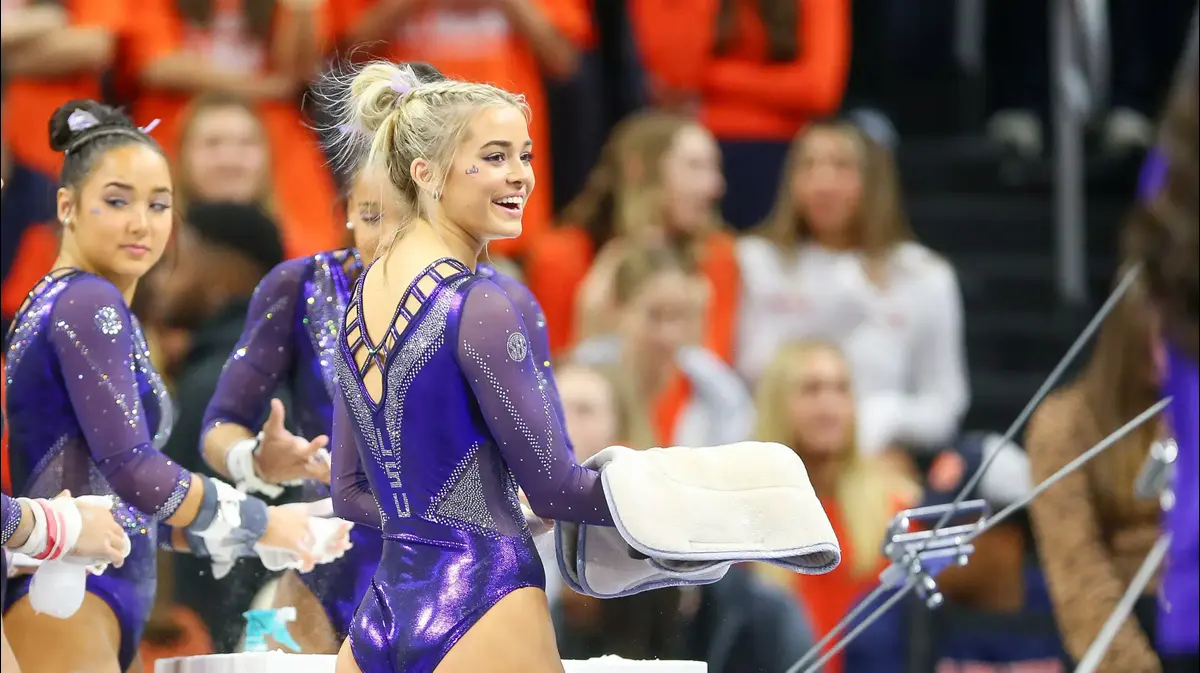Speed skiing: see the adrenaline and danger when descending at 200 km/h 2:48
Hong Kong (CNN) --
At the 2022 Beijing Winter Olympics, the face of China's sporting dreams is undeniably American.
Freestyle skier Eileen Gu's rise to the top has been meteoric, with her popularity in China soaring in the run-up to the Games.
"Snow princess Gu Ailing is ready to shine at the Olympics in her country," read a headline on state media Xinhua, referring to Gu by her Chinese name.
Beijing 2022 Winter Olympics: news, results, medals and more
But Gu, 18, has another home: the United States, where he was born to a Chinese mother and an American father, and where he discovered his love for the sport.
In 2015, just months after taking her first World Cup podium finish, the San Francisco native announced her decision to compete for China over the United States, a controversial decision that put her firmly in the spotlight. .
"It was an incredibly difficult decision to make," she wrote in an Instagram post at the time.
"I am proud of my heritage, and equally proud of my American upbringing."
A delivery man walks past an advertisement showing Eileen Gu at a bus stop in Beijing on January 11.
Since then it has become a household name in China.
As you walk through the streets, you can see his face on billboards and magazine covers.
Promotional videos for the Olympics show Gu doing tricks in the air and running up the Great Wall.
He has nearly two million followers on the Chinese social media platform Weibo, as well as multiple Chinese sponsors, brand deals and documentary film crews that follow his every move.
But behind its success is the strong pressure of being both Chinese and American at a time of heightened geopolitical tensions;
to represent her mother's homeland, a country criticized in the West for alleged human rights violations;
and trying to be an athlete and nothing more during one of the most controversial Olympic Games in recent history.
advertising
She's not alone in walking this tightrope: The Beijing Olympics feature an unprecedented number of foreign-born athletes competing for China, many of them from the United States.
Among them, Gu has become the poster child for an ambitious China, eager to prove that she has the power to attract foreign talent and mold a new type of Chinese athlete on the world stage.
But these athletes, especially those of Chinese descent, face an impossible balancing act in being between two countries and navigating the complexities of dual identity in the public eye.
an impossible position
More than a dozen athletes representing China at the Olympic Games were born abroad, and most of them are part of the men's hockey team, in which only six of the 25 members are nationals.
Actually, changing nationality for sports is quite common internationally, it's just that China was late to the game, said Susan Brownell, a Chinese sports expert at the University of Missouri-St.
The change is especially unusual, as China is a very homogeneous country and has some of the strictest immigration regulations in the world.
"China has never done anything like this," Brownell added.
There are many Caucasian faces involved, with no Chinese ethnicity or obvious ties to the country, such as former NHL players Jake Chelios and Jeremy Smith.
But it is athletes of Chinese descent who are under the most scrutiny, such as Canadian-born hockey player Brandon Yip and American-born ice skater Zhu Yi, formerly known as Beverly Zhu.
Zhu's disappointing Olympic debut served to illustrate the unique pressures these athletes face.
After she fell on the ice and placed last in the women's short program team event, Chinese social media erupted in contempt for the 19-year-old figure skater.
On Weibo, the hashtag "Zhu Yi fell" gained 200 million views in a few hours.
Many wondered why Zhu had been chosen for the team instead of a Chinese-born athlete, while others criticized her hesitant Mandarin.
"This is a shame," read one comment with 11,000 votes.
Gu and Zhu are mirror images in many ways — both were born in California and only a year apart — but Gu has wowed audiences with his fluent Mandarin and familiarity with Chinese culture, receiving little of the Chinese skepticism he pursues. to Zhou.
On Monday, Gu advanced to the Big Air finals in her first qualifying event, after the announcer introduced her as the "favourite" and caused an outcry from the crowd.
But it's unclear whether that adulation will continue if Gu doesn't get the gold medals expected of her.
And Gu's fame brings its own challenges.
She has been called "America's ungrateful daughter" by Fox News, a sentiment frequently found in her social media posts, as well as those of hockey players like Chelios.
"It's good to see you taking all your successes and achievements from the US to China and not representing the place where you were born and raised," one commenter wrote under one of Gu's Instagram posts last week.
Some have accused her of putting profit and prestige before taking a stand on human rights, with critics taking particular aim at the high-level sponsorships she has secured in China.
The United States is leading a diplomatic boycott of the Games, citing alleged human rights violations against Uyghur Muslims in China's western Xinjiang region, about which Gu has remained silent.
Through it all, Gu has tried to stay on a middle path.
She creates social media content in both English and Chinese, posts photos from Shanghai and California, pranks American audiences on TikTok while starring in Chinese-language documentaries on the Chinese mainland.
"When I'm in China, I'm Chinese. When I'm in America, I'm American," Gu told Olympic Channel at the Lausanne 2020 Winter Youth Olympics.
Last week, he alluded to this dual identity in a caption on Instagram.
"Having been introduced to the sport growing up in America, I wanted to encourage Chinese skiers in the same way my American role models inspired me," she wrote.
But as much as she wants to express both sides of her heritage and stay out of politics, the world doesn't seem to let her.
And China's acceptance of Gu also reflects its uncompromising view of nationality, which has become more insular and forceful under President Xi Jinping: either you're Chinese or you're not.
1 of 24
|
Nearly 3,000 athletes from 90 countries will compete in the Beijing Winter Olympics.
See in this gallery 25 of the most important athletes to watch closely when the games start.
Most of these have starred in previous Olympic Games.
Some compete for the first time.
(Credit: Matthias Hangst/Getty Images) →
2 of 24
| Ester Ledecká (Czech Republic) — Four years ago, Ledecká became the first athlete in history to compete in both snowboarding and alpine skiing at the same Olympic Games. And he won gold in both, winning the super-gi ski event and then following it up with a victory in the parallel giant slalom. It had been 90 years since someone had won gold in two different sports at the same Winter Games. Now 26 years old, Ledecká will try to make history in what are his third Olympic Games. (Credit: Fabrice Coffrini/AFP/Getty Images)
3 of 24
|
Erin Jackson (United States) — Jackson, the world's top-ranked speed skater in the 500 meters, stumbled at the US trials and failed to qualify for the Olympics.
But the winner of that race, veteran Brittany Bowe, gave her place to Jackson, saying "nobody deserves it more."
Jackson, 29, said she was "grateful and humbled" by Bowe's kindness.
It ended up working for both skaters in the end;
some nations returned their Olympic quota places, opening up an additional spot that would allow both Jackson and Bowe to compete.
Bowe, 33, was already ready to compete in the 1,000 and 1,500 meters.
(Credit: Dean Mouhtaropoulos/International Skating Union/Getty Images)
4 of 24
|
Johannes Høsflot Klæbo (Norway) — Norway has dominated cross-country skiing at the Olympics.
The most decorated Winter Olympian of all time, Marit Bjørgen, was a Norwegian cross-country skier.
Ella but she retired after the 2018 Games, and now Klæbo will try to pick up where she left off.
The 25-year-old got off to a great start in 2018, winning three golds on his Olympic debut in South Korea.
He has also won multiple titles at the most recent World Championships.
(Credit: Federico Modica/NordicFocus/Getty Images)
5 of 24
|
Yuzuru Hanyu (Japan) — Hanyu, one of the best male figure skaters in history, is seeking his third consecutive Olympic gold in singles.
He was just 19 years old at the 2014 Sochi Games, where he became the youngest Olympic figure skating champion since 1948. He also became the first Asian figure skater to win the men's singles title.
Hanyu's fans throw Winnie the Pooh bears on the ice after Hanyu's performance;
the tradition began after he began carrying around a box of tissues in the shape of the character in 2010. (Credit: Eugene Hoshiko/AP)
6 of 24
|
Chloe Kim (United States) — Kim, an American snowboarder, was one of the rising stars of the 2018 Winter Games, winning gold in the half pipe at the age of 17.
Four years later, she is the favorite to defend her title.
Kim has also won gold at the last two world championships.
(Credit: Ezra Shaw/Getty Images)
7 of 24
|
Mikaela Shiffrin (USA) — Shiffrin has been the face of American skiing for years and is still at the peak of her powers.
The 26-year-old, who won Olympic gold twice, leads the overall World Cup standings and recently won her 47th World Cup slalom race, the most World Cup wins in a single discipline.
Shiffrin is also the defending world champion in the combined event, which is slalom plus downhill.
She will be a medal threat in various events.
(Credit: Fabrice Coffrini/AFP/Getty Images)
8 of 24
| Ryōyū Kobayashi (Japan): Ski jumping competitions could be open this year, especially after three-time Olympic champion Kamil Stoch of Poland suffered an ankle injury in training. Kobayashi, 25, has been in great form, recently winning three of the four events at the prestigious Four Hills Tournament. Also watch out for Germany's Karl Geiger, who recently overtook Kobayashi in World Cup qualifying, and Norway's Robert Johansson, who won three Olympic medals in 2018. (Credit: Daniel Karmann/Picture Alliance/Getty Images)
9 of 24
|
Arianna Fontana (Italy) — Fontana, pictured left, has won eight Olympic medals.
That's the most tied ever by a short track speed skater.
Her specialty is the 500 meters, which she won in 2018 and has won medals in the last three Olympic Games.
Fontana was the youngest Italian to win a medal at the Winter Games when she won a bronze at the age of 15 in 2006. (Credit: She is now 31. Yomiuri Shimbun/AP)
10 of 24
|
Johannes Thingnes Boe (Norway) — Boe has won the last three World Cup titles in biathlon, a discipline that combines cross-country skiing and rifle shooting.
He won three Olympic medals in 2018, including gold in the 20-kilometer event.
The 28-year-old will be among the favorites in China, especially after the retirement of legendary French biathlete Martin Fourcade.
(Credit: Kevin Volgt/DeFodi Images/Getty Images)
11 of 24
| Wu Dajing (China) — Wu won China's only gold medal at the 2018 Olympics, breaking the world record in the 500-meter short track race. He finished with a time of 39.584 seconds, becoming only the second person in history to skid the race under 40 seconds. Wu, 27, has won four Olympic medals in her career, including a silver in the 500 meters in 2014. (Credit: Joosep Martinson/International Skating Union/Getty Images)
12 of 24
|
Natalie Geisenberger (Germany) — Geisenberger, 34, is the most decorated female luger in Olympic history, winning five medals in three Winter Games.
Four of the five medals are gold;
she has won the individual and team events at each of the last two Olympics.
(Credit: Daniel Kopatsch/Getty Images)
13 of 24
|
Nathan Chen (United States) — If anyone is the favorite to end Yuzuru Hanyu's reign in men's figure skating, it's the 22-year-old.
Chen, who has won three consecutive world titles.
Chen, the first skater to perform five quad jumps in a routine, was expected to compete for gold at the 2018 Olympics but stumbled in the short program and finished a disappointing fifth place.
(Credit: Atsushi Tomura/International Skating Union/Getty Images)
14 of 24
|
Anna Hasselborg (Sweden): Hasselborg, 32, was the jumper for the gold medal-winning curling team at the 2018 Olympics in South Korea.
She will return to China along with her teammates Sara McManus, Agnes Knochenhauer and Sofia Maberg.
Swedish women have won three curling gold medals at the Olympics, the most of any nation.
(Credit: Vladimir Pesnya/Epsilon/Getty Images)
15 of 24
|
Kamila Valieva (Russian Olympic Committee) — Valieva is only 15 years old, but this year she is the favorite in women's figure skating.
She won the Russian national championship in December and followed that up with a European title in January, breaking her own world record in the short program.
She is only the fourth female figure skater to achieve a quadruple jump in competition, and is only the second to achieve a quadruple toe loop.
She will be pushed around by two other Russian teenagers she trains with: Alexandra Trusova and defending world champion Anna Shcherbakova.
(Credit: Vladimir Pesnya/Epsilon/Getty Images)
16 of 24
| Alexis Pinturault (France) — Pinturault, 30, is the reigning alpine skiing champion, and is looking to add an Olympic gold medal to go along with the silver she won in 2018. She finished just 0.23 seconds behind Austrian Marcel Hirscher in the combined event. Hirscher is now retired. If Pinturault wins gold, he would be France's first alpine ski champion in 16 years. (Credit: Maxim Thore/Bildbyran/Reuters)
17 of 24
| Ireen Wüst (Netherlands) — The Dutch are famous for their speed skating program, and Wüst is the best of them all. No female long track speed skater has won more Olympic medals than her (11). Five of those medals are gold, including one from 2018 in the 1,500 meters. He has won a gold medal at every Winter Olympics since 2006. (Credit: Vincent Jannink/ANP/AFP/Getty Images)
18 of 24
|
Sui Wenjing and Han Cong (China) — Sui and Han, one of the world's best figure skating pairs, will be among the host nation's best hopes for a gold medal.
They lost by just 0.43 points four years ago, finishing with a silver medal.
They bounced back with gold at the 2019 World Championships. (Credit: Joosep Martinson/International Skating Union/Getty Images)
19 of 24
|
Lindsey Jacobellis (United States) — Jacobellis, right, is headed to her fifth Olympics at age 36, and she's still searching for that elusive snowboard cross gold medal.
Jacobellis had the gold medal in the bag in 2006 when she made an exhibition move in a jump and then fell.
She finished with silver and shrugged it off, saying, "Snowboarding is fun. I was having fun."
(Credit: Ezra Shaw/Getty Images)
20 of 24
|
Francesco Friedrich (Germany) — Friedrich, left, piloted two bobsleds to win Olympic gold in 2018, winning the two-man and four-man events.
(The two-man event actually finished tied for first place.)
The 31-year-old Friedrich was the sixth driver in history to win both the two-man and four-man events at the same Olympics.
(Credit: Robert Michael/Picture Alliance/Getty Images)
21 of 24
|
Timothy LeDuc (United States) — LeDuc, 31, will become the first openly non-binary athlete to compete in a Winter Olympics.
LeDuc will compete in pairs figure skating alongside 26-year-old Ashley Cain-Gribble, and the US champions' outfits defy gender stereotypes.
"My hope is that the narrative changes more to queer people being able to be open and successful in sports," LeDuc said recently.
"We've always been here, we've always been a part of sports. We just haven't always been able to be open."
(Credit: Joosep Martinson/International Skating Union/Getty Images)
22 of 24
|
Martins Dukurs (Latvia) — Dukurs, 37, has been a dominant force in the skeleton for years, winning six world championships and 11 World Cup titles, including the last three years.
But the only thing that has eluded him has been Olympic gold.
He won silver in 2010 and 2014 before finishing fourth in 2018. (Credit: Stefan Adeldberger/Expa/AFP/Getty Images)
23 of 24
|
Marie-Philip Poulin (Canada) — Poulin, one of the greatest female hockey players of all time, was nicknamed "Captain Clutch" after scoring the game-winning goals in the 2010 and 2014 Olympic finals. She also scored in the 2018 gold medal match, but the Canadians lost to the United States in a dramatic penalty shootout.
Poulin, 30, will once again lead Team Canada in China.
(Credit: Rich Lam/Getty Images)
24 of 24
|
Shaun White (United States) — White has been the face of snowboarding since 2006, when he won gold in his Olympic debut and was known as the "flying tomato" for his flowing red hair.
He has won gold in the half pipe event four times, and his most recent victory in 2018 sparked an emotional celebration.
At 35 years old, this is likely to be his last Olympics, and he will be looking to come out on top.
But he will face stiff competition from a talented field that includes Japan's Yuto Totsuka, the defending world champion.
(Credit: Clive Rose/Getty Images)
The Citizenship Debate
The citizenship question hangs over Gu, and over many of the foreign-born athletes.
China does not allow dual citizenship, and in recent years the government has cracked down and encouraged people to report people who secretly hold two passports.
There are very few exceptions to the ban, and it is highly unlikely that any of these exceptional circumstances would apply to the athletes in question, said Donald Clarke, a George Washington University Law School professor specializing in Chinese law.
"The only way hockey players could become Chinese citizens is by naturalizing, and under China's nationality law, they have to give up their foreign citizenship," Clarke told CNN.
The same goes for Gu.
Eileen Gu after placing first in the women's freestyle halfpipe at the Toyota US Grand Prix on January 8, 2022 in Mammoth, California.
But it is not clear if that has been fulfilled.
Gu has never publicly shared whether she gave up her US citizenship to compete for China, and speculation increased after she applied for the US Presidential Scholarship Program in 2021, which is only open to US citizens or permanent residents.
The official site of the Olympic Games appeared to confirm her status in a January article that made reference to Gu's "dual nationality".
Both Clarke and Brownell said China has most likely made an exception to its own rules to allow foreign-born athletes to keep two passports, in hopes of bolstering their Olympic medal tally, which the Chinese government has long touted. as a sign of national strength.
The main questions about the 2022 Winter Olympics, answered
This strategy could be "an experiment by the leadership, who will judge the reaction of the public before deciding whether to go ahead with the practice on a larger scale and allow dual nationality for athletes," Brownell said.
Chinese authorities have carefully avoided the question of Gu's nationality, emphasizing his Chinese heritage.
She is what the government often calls "Overseas Chinese," meaning foreign nationals of Chinese descent, who are given that label regardless of their citizenship or how many generations of their family have lived abroad.
Since Xi took office, he has repeatedly claimed that overseas Chinese also belong to the nation, and has repeatedly vowed to "unite overseas Chinese" with their relatives in China as part of the "Chinese dream."
It seems that Gu is part of that Chinese dream, as the government and its propaganda machine rush to present her as their own.
"I have very deep roots in China," Gu told state broadcaster CCTV, according to the state-run nationalist tabloid
Global Times.
He added that he had been in China when it was announced that the Winter Games would be held in Beijing, and that's when "I started thinking about competing for China."
In an article, Xinhua noted that Gu visited Beijing every summer in his childhood, watched the 2008 Beijing Olympics from the stands, and loved Peking duck and dumplings.
Gu "should be an idol to the whole world", a Chinese fan declared to the
Global Times
.
"Before people wanted to be American, why not accept that people want to be Chinese now?"
2022 Winter Olympics.









